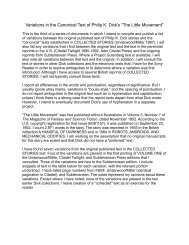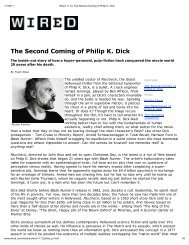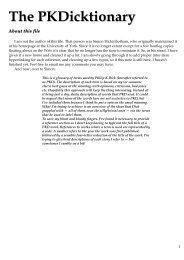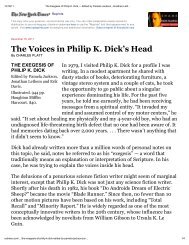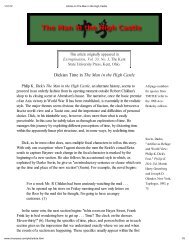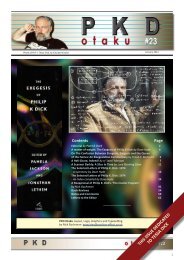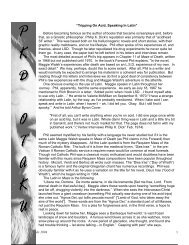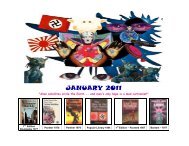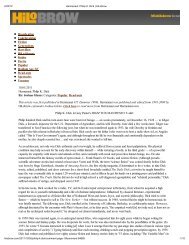PKD Otaku Issue 27 - Philip K. Dick Fan Site
PKD Otaku Issue 27 - Philip K. Dick Fan Site
PKD Otaku Issue 27 - Philip K. Dick Fan Site
You also want an ePaper? Increase the reach of your titles
YUMPU automatically turns print PDFs into web optimized ePapers that Google loves.
cocious behavior (Rickman, TTHC) and later interests how<br />
extensive this was. We know that during his childhood he<br />
attended a Quaker school and in his final years also seems<br />
to have identified with Quakers,<br />
which is consistent with<br />
roots in a pacifistic German<br />
community. His early stories<br />
have strong antiwar motifs<br />
and his writing thereafter<br />
continued to be informed by<br />
a pacifist ideology.<br />
One of the most intriguing<br />
pieces of evidence<br />
for Germanic roots is found<br />
in a letter <strong>PKD</strong> wrote to Claudia<br />
Krenz Bush, dated May 9,<br />
1974. In it <strong>Dick</strong> allowed how,<br />
“[O]ne time years ago, I woke<br />
up one night and saw a figure<br />
standing by my bed and I<br />
recognized it as me. My wife<br />
suddenly woke up too and<br />
began screaming. I trying to<br />
soothe her kept saying over<br />
and over, “Ich bin’s,” which<br />
the next day I looked up in my<br />
German dictionary. It is the idiom for “It is I,” but I didn’t<br />
know that. Later on, up to now even, in fact more and<br />
more, under abrupt duress, I can only speak in German,<br />
and it isn’t the formal polite German I learned in high<br />
school, but rather a low or PlattDeutsch, very low class<br />
and vernacular, a sort of street German, and accurate --<br />
with precision, but no class.” (emphasis added) (letter at<br />
Cal State Fullerton <strong>PKD</strong> collection).<br />
“PlattDeutsch,” of<br />
course, is the “low German”<br />
still used to this day by certain<br />
Mennonites and other<br />
Germans who emigrated to<br />
America from Russia or Prussia,<br />
and has resemblances to<br />
the dialect known as “Pennsylvania<br />
Dutch” (and Yiddish,<br />
for that matter). Most Americans<br />
don’t even know the<br />
word, but <strong>Dick</strong> did.<br />
Unless one subscribes to the theory that a suprahistorical<br />
source, i.e. a vast active living intelligent system,<br />
bestowed this tongue on <strong>Dick</strong>--and of course <strong>Dick</strong> may<br />
have subscribed to exactly that theory--it would seem that<br />
the most plausible explanation for this outburst by <strong>Dick</strong><br />
Why did <strong>PKD</strong> wish<br />
to make a “cryptic”<br />
reference to these<br />
wars of rebellious<br />
Protestants?<br />
is that he was reverting to a language still residual in his<br />
subconscious. If he had indeed been an abuse victim at<br />
the hands of German speakers, of course, the most stressful<br />
and repressed event(s)<br />
in his young life would have<br />
been those times that he<br />
was subjected to abuse.<br />
Might J. Edgar <strong>Dick</strong> or occultists<br />
have thrust (to use<br />
Jim Keith’s concept) upon<br />
<strong>PKD</strong> a secret history or entrusted<br />
a mission to him<br />
or “programmed” <strong>Philip</strong> in<br />
some way, a la “The Manchurian<br />
Candidate,” while<br />
he was yet a child or youngster?<br />
Might such events<br />
have prompted a morethan-usual<br />
interest by <strong>PKD</strong><br />
in things German? Whatever<br />
the case, <strong>PKD</strong> developed<br />
a love and fascination for<br />
the German language, German<br />
literature and German<br />
music which seems unusually<br />
intense for a “Scottish”<br />
lad in Berkeley, and his most<br />
famous novel tackles an alternative post-WWII universe.<br />
<strong>Dick</strong> reveals the extent of his erudition in Germanic<br />
esoterica when he traces the title of that awardwinning<br />
novel, “The Man In the High Castle,” to a stronghold<br />
of the Bohemian Thirty Years War: “I wished to make<br />
a cryptic reference to the wars of liberation engaged in<br />
by the Czech and Dutch Protestants against the Catholic<br />
powers....[The] heroic act by<br />
Mr. Tagomi resonates with<br />
the heroic acts on the part of<br />
the Elector Palatine Frederick<br />
V.” (Rickman, TTHC).<br />
Why did <strong>PKD</strong> wish to<br />
make a “cryptic” reference to<br />
these wars of rebellious Protestants?<br />
Hawthorne Abendsen,<br />
a protagonist found in “High<br />
Castle,” may have been modeled<br />
in part on one of <strong>Dick</strong>’s<br />
own science fiction mentors,<br />
A. E. Van Vogt. Rickman<br />
documents that the “suit Abendsen wears is Van Vogt’s”<br />
(TTHC). Van Vogt was born to “Dutch” parents in a farm<br />
home near Winnipeg, Manitoba, a city with the highest<br />
concentration of Mennonites in the world. (As an aside,<br />
one can find via web search a controversial tractate ti-<br />
<strong>Philip</strong> K <strong>Dick</strong> - 6 years old<br />
13<br />
And, at last, final victory for the Dutch hellfire-preachers...



